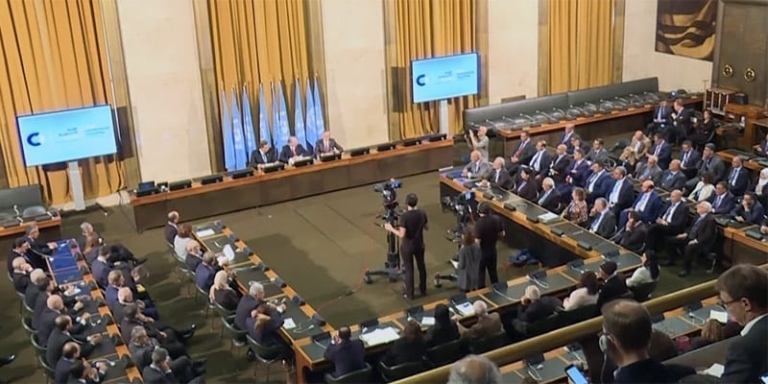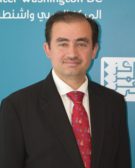
The third round of political negotiations in Geneva between the Syrian government and the opposition ended on August 28 without a breakthrough or even a modicum of progress on finding a solution to the Syria crisis. The sole voice of optimism during and after the round was that of UN Special Envoy for Syria Geir Pedersen, who still said that the negotiations were challenging and the gap between the two sides remains wide. In fact, the only hopeful conclusion he was able to offer was that the two sides were respectful of each other and ready to resume talks in the future.
The meetings came after a nine-month hiatus because of disagreements about the agenda and concerns about COVID-19 infections that are widespread in Syria, despite government announcements to the contrary. The start of this meeting was delayed when it was discovered that four Syrian participants were already infected.
In reality, however, the Geneva meetings that were tasked to discuss the future of Syria were doomed from their start in 2012 under the auspices of the United Nations. Since then, there has been no discernible effect on the ground; to be sure, all consequential events and developments regarding the Syrian conflict were unrelated to Geneva and were a result of regional and international efforts.
Geneva’s Sordid Record from 2012 to 2020
No less than 12 conferences and meetings were convened in Geneva between 2012 and 2020, and none had tangible results. The first was held in June 2012 and was chaired by the former UN envoy, Lakhdar Brahimi, and included delegations from the Syrian regime and the National Coalition for Syrian Revolutionary and Opposition Forces. That inaugural meeting merely issued a final communiqué that called for a political solution to the crisis in the country. However, it failed to reach agreement on implementating said solution because of a deep international division between the United States and European states, which supported the Syrian opposition, and Russia, which backed Bashar al-Assad’s regime.
No less than 12 conferences and meetings were convened in Geneva between 2012 and 2020, and none had tangible results.
In August 2013, the Syrian civil war reached new heights when the regime used chemical weapons against civilians in the Eastern Ghouta suburb of Damascus. That attack prompted the Barack Obama Administration to threaten the use of force against Syrian forces, which in turn led to UN Security Council Resolution 2118 in September 2012 that, aside from stripping the regime of its stockpile of chemical weapons, included a provision to facilitate the convening of an international conference to implement the Geneva communiqué of June 2012.
The provision in the resolution about implementing a political solution was soon forgotten in the frenzy to rid the Syrian regime of chemical weapons. The United States and other observer states focused on this side of the Syrian equation, which gave the regime an opportunity to ignore the Geneva communiqué, aided and buttressed by the resultant belief that the Obama Administration was indeed not interested in military intervention in Syria. A new call for negotiations in Geneva in February 2014 was issued to the regime and the opposition; but a five-day meeting ended fruitlessly with the UN envoy declaring that the negotiations reached a dead end because of unbridgeable differences between the two sides.
The Russian military intervention in the Syrian civil war in September 2015 added a very serious complication in finding a political solution to the conflict. The Geneva path soon became almost impossible to walk, especially that the gap between the regime and the opposition grew wider. The year 2015 also witnessed the failure of a US-led process called the International Syria Support Group, whose only success was UNSC Resolution 2254 of December 2015. This created a roadmap of a UN-supervised political process that would span six months, during which discussions would start about new free and fair elections and a new constitution, among other issues.
Other Geneva meetings were convened and supervised by a new UN envoy, Staffan de Mistura, in January 2016 and February 2017, but they led nowhere because of different interpretations of Resolution 2254 by the delegations of the regime and the opposition. In fact, although de Mistura and others knew that differences were irreconcilable, they kept on calling for meetings. But the most serious impediments were the actual developments on the battlefield, with Russia and Iran fully committing to a victory by the Assad regime. Soon Russia called for talks in Astana, Kazakhstan, where it emerged as the dominant actor after the military victories it secured against the weakened opposition. The Astana process became the new track for negotiations.
The most serious impediments [to successful negotiations] were the actual developments on the battlefield, with Russia and Iran fully committing to a victory by the Assad regime.
De Mistura resigned his position around the middle of 2018 without achieving any real results. He was succeeded by Geir Pedersen, who shifted his attention to the establishment and development of a constitutional committee that he perceived as the only aspect that garnered international support. The Syrian opposition, however, always considered this to be a violation of Security Council resolutions that called for the formation of a transitional government to supervise independent elections under the auspices of the United Nations. This in turn led to divisions within the opposition, a majority of which still believed that it should stick with the Geneva track. Those who approved of Pedersen’s constitutional committee track formed a group that would supposedly represent the opposition in the constitutional talks.
Needless to say, three subsequent meetings of the constitutional committee––in October 2019, November 2019, and August 2020––failed to arrive at any concrete results. Representatives from the regime have become experts at dissipating efforts and wasting time over tangential issues. In essence, nothing was produced during the eight years after the Geneva track began and with the twelve meetings that were convened. This is well known to the opposition, to the United States, and to the international community.
What Is to Be Done?
The failure of this long track of negotiations to resolve the Syrian crisis has exposed the serious flaws in the role played by the international community. At the same time, the Syrian opposition has become divided and has lost much of its representativeness, legitimacy, and credibility. It hardly has any political weight to bring to the negotiations with the Syrian regime, which continues to be protected by Russian and Iranian military power. As for the Assad regime itself, it has exploited all the opportunities of prolonged and failed negotiations to restructure and strengthen itself vis-à-vis the opposition and the Syrian people. At the same time, the regime rejects any attempts at finding a political solution that could meet at least some of the wishes and demands of the Syrian people.
The regime rejects any attempts at finding a political solution that could meet at least some of the wishes and demands of the Syrian people.
What could help now in ameliorating past failures is for the United States—which succeeded in imposing the Caesar Act and its sanctions on the Syrian regime and its domestic and external supporters––to reevaluate how to revive the Geneva process. Only in returning to the promise of a political solution called for in UN Resolution 2254, one that ensures free and independent elections, a responsive and democratic constitution, and the rebuilding of state institutions, could the Syrian people feel that there is an end to the suffering they have endured as a result of a brutal and destructive civil war.

